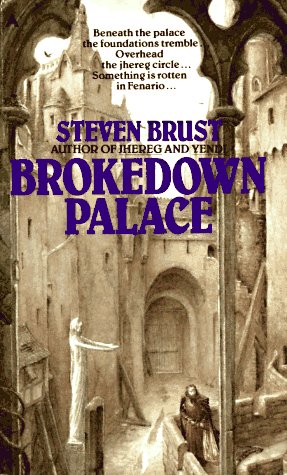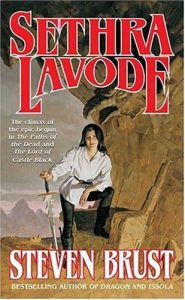Here’s an irony for you. Despite being the book I finished most recently (and wrapping up today’s spate of reviews, in fact), it’s the one I remember least. Not, I’m pretty sure, as a reflection on Inferno‘s quality, either. I know I was liking it as I read. Anyway, though, I can say a few things about it. The first of which is that it feels like the second half of its predecessor, The Divine Comedy. And, okay, eponymously speaking, that seems apparent. But I still find it noteworthy because of the regularity with which graphic novel editors make a point of having standalone collections, as far as an ongoing series can accomplish that. And given the thematic divisions that tend to accompany plot breaks in Gaiman’s work and its spinoff here, it’s more noteworthy still. Which I guess is a lot of time spent to say, “Huh, it’s two halves of the same basic storyline, and that doesn’t happen often,” but like I said, it is unusual for the format.
Thirdly[1], I have a fair amount of respect for the character evolution that Carey has been giving Lucifer. He’s always been an interesting and occasionally, briefly, likeable anti-hero. It would be hard to publish very many months’ worth of comics without that much to recommend the main character. But at some point that has crept up on me unawares, there was a tipping point to a process I hadn’t really perceived before the fact: he’s been gradually infusing Lucifer with a certain nobility of spirit[2] to match his uncompromising (albeit typically self-serving) sense of honor, to the point where now, any time things seem to be going pear-shaped, I’m not merely interested to see the story of how he twists things to his advantage and wins after all. No, at this point in the tale, I unexpectedly find myself genuinely disappointed at the idea that he might not win through. Sympathy for the devil, indeed.
Also? Mazikeen[3] has surprised me once again, and I think before very long at all she will be my favorite character in the series, and maybe even retroactively a very strong finisher in Sandman itself.
[1] I know what you are thinking. I respectfully disagree.
[2] See also the impressive To Reign in Hell, by the always impressive Steven Brust.
[3] Who I see I have never previously mentioned is Lucifer’s one-time right-hand woman, and more recently (as the newly-appointed leader of her people) one of his many grasping adversaries. Though of course it’s more nuanced than that.
 Seriously. If this is the kind of experience any given regular person has when reading fiction, I can force myself to feel a little bit of sympathy for the non-readers of the world. It was very good, and certainly easy to follow on the primary level. Four brothers, a king and his siblings, must decide how to deal with the gradual decay of their familial home and the seat of the kingdom’s power. Sides are chosen, battles are fought, dragons are incidentally slain. So why did I feel like I spent the entire book trying to catch up and understand what was really going on?
Seriously. If this is the kind of experience any given regular person has when reading fiction, I can force myself to feel a little bit of sympathy for the non-readers of the world. It was very good, and certainly easy to follow on the primary level. Four brothers, a king and his siblings, must decide how to deal with the gradual decay of their familial home and the seat of the kingdom’s power. Sides are chosen, battles are fought, dragons are incidentally slain. So why did I feel like I spent the entire book trying to catch up and understand what was really going on? One of the problems with having a booklog is all the books that you had read just before you started chronicling all the books you read, that probably were the very books that led you to say, ‘Hey, there are books out there that people deserve to know about!’, and thus inspired you to get started on such a singularly self-involved project as a booklog. (I know what you’re thinking. ‘You read crap books all the time, nearly constantly in fact, and how dare you pretend that this is something people deserve to know about?’ Well, I do think that very thing, because I have to warn people of the bad stuff too. It’s just that serving as an object lesson wasn’t sufficient impetus, in the way that flagging down the really good books has been.)
One of the problems with having a booklog is all the books that you had read just before you started chronicling all the books you read, that probably were the very books that led you to say, ‘Hey, there are books out there that people deserve to know about!’, and thus inspired you to get started on such a singularly self-involved project as a booklog. (I know what you’re thinking. ‘You read crap books all the time, nearly constantly in fact, and how dare you pretend that this is something people deserve to know about?’ Well, I do think that very thing, because I have to warn people of the bad stuff too. It’s just that serving as an object lesson wasn’t sufficient impetus, in the way that flagging down the really good books has been.)